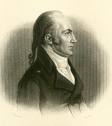Aaron Burr - American Patriot

Library of Congress
Aaron Burr was born in February, 1756 in New Jersey. The son of Aaron Burr, Sr., second president of Princeton University, and the grandson of Jonathan Edwards, he graduated at 16 from the College of New Jersey (later Princeton) as a theologian. He eventually moved to the study of law.
In 1775, Burr served as a volunteer in Benedict Arnold's campaign in Canada during the Revolutionary War. He joined George Washington's staff in New York City in 1776, but left a few weeks later after a run-in with the general. In June of the same year, he joined the staff of General Putnam and saw action in the Battle of Long Island and the evacuation of New York City. Commissioned as a lieutenant colonel in 1777, he commanded a regiment at the young age of 21. Burr spent the winter of 1777-78 in Valley Forge, and commanded a brigade after leaving in 1778.
He resigned his commission in 1779 due to ill health and returned to school. In 1782, he married Theodosia Bartow Prevost, the widow of a British officer, although she was 10 years older. They had a daughter, Theodosia, born in 1803, who died at sea in 1813. Aaron and Theodosia were married 12 years before she passed away.
Burr was a successful attorney, and moved to New York in 1783 to share a practice with Alexander Hamilton. He desired a career in politics, but was unsuccessful until he was named New York Attorney General in 1789. Later elected Senator in 1791, he served six years and won a seat in the state legislature after a failed re-election attempt to the Senate, eventually losing that seat, as well, in 1799. He then began the formation of the Democratic Party in New York City.
The Party became powerful quickly, fielding a ticket with Thomas Jefferson as President and Aaron Burr as Vice-President. Neither man liked the other, and voting at the convention became deadlocked after numerous votes. Alexander Hamilton stepped in and helped Jefferson win. After running for the Governorship of New York and losing, and blaming his failed political career on Hamilton, the situation eventually lead to the famous Burr-Hamilton duel in 1804 in which Hamilton was killed. Although he had lost the job in New York, he remained in Jefferson's administration.
Burr was later charged with treason for trying to capitalize a war with Spain, but was acquitted in 1807. Moving to England in 1808, he hoped to gain support for a revolution in Mexico. After being run out of England, he tried to gain the support of Napoleon Bonaparte, but failed there, as well. Penniless by this time, he finally started sailing home in 1811, but the ship was stopped by the English and held until the following year. After finally gaining his freedom, Burr returned to his legal practice in New York.
He married again in 1833, this time to the widow of Stephen Jumel. When she realized he was using her money to speculate on land, they separated after four months. She sued for divorce around the time of their first anniversary, and it was granted the day Burr died, 14 Sept 1836.
Sources:
http://www.en.wikipedia.org/wiki/Aaron_Burr
http://www.ushistory.org/valleyforge/served/burr.html
http://bioguide.congress.gov/scripts/biodisplay.pl?index=B001133